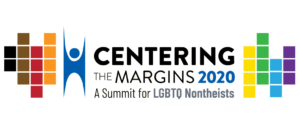Re-Centering the Margins: LGBTQ Humanist Alliance to Hold Second Annual Summit

The inaugural Centering the Margins summit, hosted by the American Humanist Association (AHA) and the LGBTQ Humanist Alliance in March of 2019 brought together BIPOC (Black, Indigenous, people of color) LGBTQ humanists, atheists, and freethinkers. The mission of the LGBTQ Humanist Alliance is to cultivate safe and affirming communities, promote humanist values, and achieve full equality and social liberation of LGBTQ persons. In pursuit of this mission, the alliance works at the national level to build a thriving network of LGBTQ humanists and partners devoted to compassionate activism. Through grassroots activism and events such as Centering the Margins, members of the alliance work to raise awareness, advance social progress of queer communities, and build relationships with other corresponding and allied communities.
In 2009 the LGBT Humanist Council formed as a project of the AHA in partnership with the Gay and Lesbian Atheists and Humanists (GALAH). They got their start when local leaders gathered at the World Humanist Congress in Washington, DC, that June to discuss how the humanist community could reach out to the LGBT community and recognize the growing number of LGBT humanists. Their first priorities were to provide LGBT humanists across the country with a forum to exchange ideas on local organizing, find support in coming out as LGBT and as a humanist, and to speak out with one voice on issues of concern to the LGBT humanist community. In this capacity they organized for same-sex marriage and equal benefits for same-sex partners in the State Department, and they protested both the anti-gay papal agenda and the Boy Scouts’ discriminatory policies against gays and atheists.
Although the name has changed to reflect an expanded constituency, the alliance continues to fight for the rights of LGBTQ humanists and nontheists. We recognize that we should celebrate our wins in marriage equality but also understand that the fight for marriage equality asks members of our community to participate in a potentially harmful assimilation that stretches the marginalization gap. There are numerous LGBTQ rights issues that disproportionately impact queer communities and demand attention in our ever-changing political climate. These include healthcare deprivations, homelessness, and violence targeting queer and trans people. The LGBTQ Humanist Alliance is dedicated to realizing a more inclusive humanism that confronts these issues head on through education and advocacy.
The creation of the Centering the Margins summit reflects the LGBTQHA’s commitment, internally and externally, to advance much needed anti-racism efforts in our country. The alliance believes that many progressive movements, including, at times, our humanist movement, demand that people work in silos, that people choose either the room where racial justice work happens, or the room where LGBTQ equality work happens, or the room where secularist work happens. Centering the Margins is committed to creating and maintaining a safe, productive, and welcoming experience for everyone, regardless of gender, sexual orientation, disability, neuroatypicality, physical appearance, body size, race, nationality, ethnicity, or religion. As a movement, we can only succeed if we work as a cooperative, proactive, and supportive community.
The inaugural summit was held at the Washington Ethical Society in Washington, DC. The event featured a musical performance by Danile Rogiérs, plenary addresses by Black Humanist Alliance Leadership Council Chair Ashton Woods and the Vice President of Programs at American Atheists Debbie Goddard, caucuses, and more. In addition, LGBTQ Humanist Alliance member Tris Mamone and social justice activist Danna Pope facilitated a “White Folk against Racism” caucus for White-identifying attendees, while Lucky Garcia and Diane Burkholder facilitated a caucus for Black, Indigenous, and People of Color.
The day brought together folx who were engaging in humanism for the first time, longtime activists, and everyone in between while centering the identities too often marginalized in the secular community. Attendees discussed anti-racism, making intentional spaces, secular organizing, and shared stories about what it means to show up as our full selves.
All of the sessions from last year were recorded and are available on YouTube. The LGBTQHA is now in the process of planning their second annual Centering the Margins, but this year the conference will be virtual. Speaker applications are still open. If you would like to apply to be a speaker, you can so by clicking the link here. If you have any questions before applying, send those to CTMproposals@americanhumanist.org.
